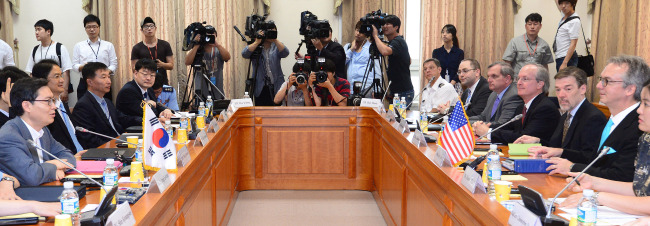Seoul, Washington start talks on sharing cost of USFK upkeep
By Shin Hyon-heePublished : July 24, 2013 - 20:42
South Korea and the U.S. opened tough negotiations Wednesday over how to share costs for the upkeep of American troops here as Washington calls for Seoul to increase its financial support amid North Korean threats and U.S. budget cuts.
It is the second round of high-level talks to renew the Special Measures Agreement on burden-sharing for the some 28,500-strong U.S. Forces Korea due to expire at the end of this year.
The two-day meeting was led by Hwang Joon-kook, former minister at the South Korean Embassy in Washington, and Eric John, foreign policy adviser to the Air Force chief of staff.
It is the second round of high-level talks to renew the Special Measures Agreement on burden-sharing for the some 28,500-strong U.S. Forces Korea due to expire at the end of this year.
The two-day meeting was led by Hwang Joon-kook, former minister at the South Korean Embassy in Washington, and Eric John, foreign policy adviser to the Air Force chief of staff.

Washington is calling for a sharp rise in Seoul’s share, stressing escalating strategic threats from Pyongyang, its ally’s rapid economic growth and its own fiscal woes culminating in the so-called sequester.
Under the deal, last revised in 2008, Seoul shoulders 869.5 billion won ($778.1 million) this year, about 42 percent of the total cost. The funds are largely used to pay wages for the forces’ South Korean hires, facility construction fees and service contracts.
The allies first signed the pact in 1991 and the current one is the eighth of its kind.
The U.S. is believed to be seeking to hike the sum to at least 1 trillion and the ratio to 50 percent for next year, whereas South Korea wants to reflect basic factors like inflation only.
But Seoul may find it difficult to reject its biggest ally’s demand given the fast-evolving security dynamics on the peninsula in the wake of North Korea’s third nuclear test in February and successful rocket launch in December.
During the first negotiations early this month, the U.S. alluded to increasing North Korean threats as grounds for a spike in South Korea’s contribution.
Though the U.S. is striving to scale down overseas bases due to $50 billion in cuts in defense spending, its units here have obtained a waiver to maintain combat readiness.
A key U.S. diplomat said it was “only natural” for Korea to pay more in light of its economic prosperity and the two countries’ increasingly robust alliance.
Seoul’s recent request for another delay in wartime control transfer could also boost Washington’s leverage, analysts say.
“The U.S. is likely to emphasize the gravity of the peninsula’s security circumstances to get an upper hand in the negotiations while saying it will offer more benefits including its nuclear umbrella,” said Shin In-gyun, president of the non-profit Korea Defense Network.
“Both the wartime operation control transfer and burden-sharing are defense and security issues and thus cannot be dealt with separately. For Washington, a delay in the OPCON transfer means a greater sacrifice in its military power and labor force so that it is natural for them to call for a bigger portion from Seoul.”
The Foreign Ministry here said that the U.S. had not indicated any intent to link cost-sharing talks with the OPCON transfer.
“The U.S. is our ally and plays a crucial role in maintaining the region’s peace and stability,” spokesman Cho Tai-young told reporters on Tuesday.
“The negotiations will be carried out in consideration of our financial capability and the USFK’s stable stationing.”
By Shin Hyon-hee (heeshin@heraldcorp.com)









![[Kim Seong-kon] Democracy and the future of South Korea](http://res.heraldm.com/phpwas/restmb_idxmake.php?idx=644&simg=/content/image/2024/04/16/20240416050802_0.jpg&u=)







![[KH Explains] Hyundai's full hybrid edge to pay off amid slow transition to pure EVs](http://res.heraldm.com/phpwas/restmb_idxmake.php?idx=652&simg=/content/image/2024/04/18/20240418050645_0.jpg&u=20240418181020)

![[Today’s K-pop] Zico drops snippet of collaboration with Jennie](http://res.heraldm.com/phpwas/restmb_idxmake.php?idx=642&simg=/content/image/2024/04/18/20240418050702_0.jpg&u=)